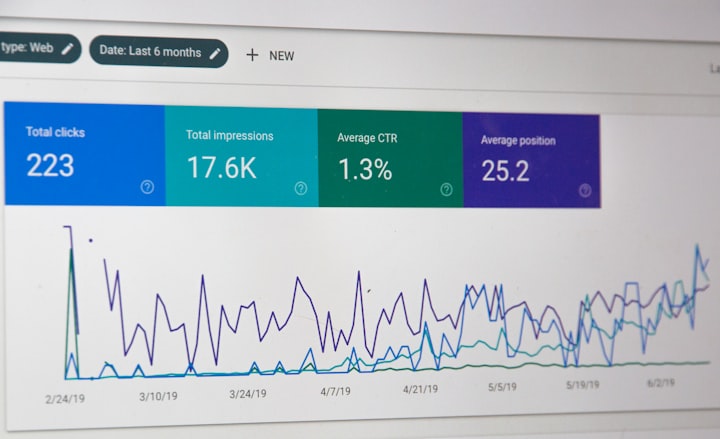The Ultimate SEO Course: Dominate Search Engine Rankings and Drive Traffic
Looking to improve your website's search ranking and drive organic traffic? Look no further than our complete SEO course. From keyword research and on-page optimization to link building and analytics, our comprehensive guide covers everything you need to know to dominate search engine rankings and achieve your business goals. Start your SEO journey today!

Introduction
SEO (Search Engine Optimization) is the practice of optimizing websites to improve their ranking on search engine results pages (SERPs). It is an essential aspect of digital marketing, as search engines like Google are often the primary source of traffic for websites. An effective SEO strategy can help businesses reach their target audience, increase website traffic, and generate leads and sales.
In this comprehensive SEO course, we will cover everything you need to know to create an effective SEO strategy for your website. We will cover the following topics:
- Keyword Research
- On-Page Optimization
- Technical SEO
- Off-Page Optimization
- Local SEO
- Content Marketing
- Analytics and Reporting
1. Keyword research
Keyword research is the process of identifying the specific keywords and phrases that people use to search for topics related to your business or industry. Keyword research is the foundation of any SEO strategy, as it helps you understand what your target audience is searching for and what keywords you should target.
To conduct keyword research, you can use tools like Google Keyword Planner, SEMrush, Ahrefs, or Moz Keyword Explorer. These tools will help you identify relevant keywords and show you how competitive they are.
Once you have identified your target keywords, you should include them in your website's content, meta tags, and URLs. However, you should avoid keyword stuffing, as it can lead to a penalty from search engines.
2. On-Page Optimization
On-page optimization refers to optimizing the content and structure of your website to improve its ranking on search engines. On-page optimization includes the following:
a) Title Tag: The title tag is the text that appears at the top of the browser window and in search engine results. Your title tag should be relevant to the content of your page and include your target keyword.
b) Meta Description: The meta description is a short summary of your page's content that appears in search engine results. It should also include your target keyword and be compelling enough to encourage users to click through to your website.
c) Header Tags: Header tags (H1, H2, H3, etc.) are used to structure your content and make it easier for users to read. They also signal to search engines what your page is about.
d) Content: Your website's content should be relevant, high-quality, and provide value to the user. Use your target keywords naturally throughout the content, but don't overuse them.
e) URL Structure: Your URL structure should be easy to read and include your target keyword.
f) Internal Linking: Internal linking refers to linking to other pages on your website. This helps search engines understand the structure of your website and improves user experience.
3. Technical SEO
Technical SEO refers to the technical aspects of your website that affect its ranking on search engines. Technical SEO includes the following:
a) Site Speed: Your website's loading speed is an important ranking factor. Use tools like Google PageSpeed Insights to identify issues that affect your website's loading speed.
b) Mobile-Friendliness: Your website should be optimized for mobile devices, as most users access the internet from their mobile devices.
c) Site Architecture: Your website's architecture should be well-structured and easy to navigate. This includes using a sitemap and optimizing your website's internal linking structure.
d) Schema Markup: Schema markup is a type of structured data that provides additional information about your website's content to search engines. It can improve the appearance of your website in search engine results.
4. Off-Page Optimization
Off-page optimization, also known as off-site optimization, refers to the actions taken outside of your website to improve its ranking on search engines. While on-page optimization focuses on optimizing the content and structure of your website itself, off-page optimization focuses on building your website's authority and reputation through external factors.
The most important factor in off-page optimization is building high-quality backlinks. Backlinks are links from other websites to your website. The more high-quality backlinks you have, the more search engines will view your website as an authority in your industry, and the higher your website will rank on search engine results pages.
However, not all backlinks are created equal. Search engines prioritize backlinks from high-authority websites in your industry, and backlinks that use relevant anchor text (the text used to create the hyperlink) are more valuable than those that use generic or unrelated text.
There are many strategies for building high-quality backlinks, including guest blogging, creating shareable content like infographics or videos, and reaching out to industry influencers for collaboration opportunities. It's important to note that building backlinks should be done organically, without resorting to tactics like buying links or participating in link schemes, which can result in penalties from search engines.
In addition to backlinks, other off-page optimization strategies include:
Social media activity: Sharing your website's content on social media platforms can help increase its visibility and drive traffic to your website. Additionally, social media activity can help establish your brand's credibility and authority in your industry, which can lead to more backlinks and higher rankings on search engines.
Online directory listings: Listing your business on online directories like Google My Business, Yelp, and other industry-specific directories can help improve your website's visibility in local search results.
Brand mentions: Mentions of your brand on other websites, even without a hyperlink, can help increase your website's visibility and authority in your industry.
Influencer marketing: Collaborating with influencers in your industry to promote your brand and content can help increase your website's visibility and drive traffic to your website.
Off-page optimization is an important aspect of SEO, as it helps establish your website's authority and reputation in your industry. By building high-quality backlinks, engaging on social media, and pursuing other off-page optimization strategies, you can improve your website's ranking on search engine results pages and reach your target audience effectively.
5. Local SEO
Local SEO is the practice of optimizing your website and online presence for local searches. Local SEO is particularly important for businesses with physical locations, as it helps them reach customers in their local area.
To optimize your website for local searches, you should include your business's name, address, and phone number (NAP) on your website and ensure that it is consistent across all online directories and listings. This includes Google My Business, Yelp, and other industry-specific directories.
You should also include location-specific keywords in your website's content and meta tags, and create content that is relevant to your local area. This could include creating location-specific landing pages or blog posts.
6. Content Marketing
Content marketing is the practice of creating and promoting high-quality, valuable content to attract and engage your target audience. Content marketing is an important aspect of SEO, as search engines prioritize websites with high-quality, relevant content.
To create effective content, you should focus on topics that are relevant to your target audience and incorporate your target keywords naturally throughout the content. You should also ensure that your content is well-written, visually appealing, and provides value to the user.
Promoting your content is also important. You can share your content on social media, reach out to industry influencers for collaboration opportunities, and engage with your audience through comments and social media interactions.
7. Analytics and Reporting
Analytics and reporting are important for measuring the success of your SEO strategy and identifying areas for improvement. Google Analytics is a powerful tool that can help you track website traffic, user behavior, and conversion rates.
You should regularly review your analytics data to identify trends and patterns, and make adjustments to your SEO strategy accordingly. This includes identifying your website's top-performing pages and optimizing them further, as well as identifying pages that are underperforming and making changes to improve their ranking on search engines.
Conclusion
SEO is a complex and ever-evolving field, but with a solid understanding of the fundamentals and a commitment to ongoing optimization and improvement, you can create an effective SEO strategy that drives traffic, generates leads, and helps you achieve your business goals. By conducting thorough keyword research, optimizing your website's content and structure, building high-quality backlinks, and regularly monitoring and adjusting your strategy, you can improve your website's ranking on search engines and reach your target audience effectively.
A bunch of other articles about SEO that I must recommend you to read to gain knowledge:
Rank Vocal Media Article into Google
Three Amazing Free Sites to Drive Organic Traffic to Your Vocal Media Article
Simple SEO steps for Beginners to Rank in Google Search Engine
An Author also provides good tips about ranking your Vocal Media Article on Google, I will suggest you read it as well.
If you enjoy reading this post, got help, knowledge, inspiration, and motivation through it, and want to support my efforts — you can “buy me a Ko-Fi.” Your support really makes a difference.
About the Creator
makelivingonline
A passionate writer, freelancer, blogger, explorer, and learner. If you want to learn to survive in the online world—join me hear.
❦Freelancing ❦Blogging ❦EarningMoneyOnline ❦Writing
@makelivingonline






Comments
There are no comments for this story
Be the first to respond and start the conversation.